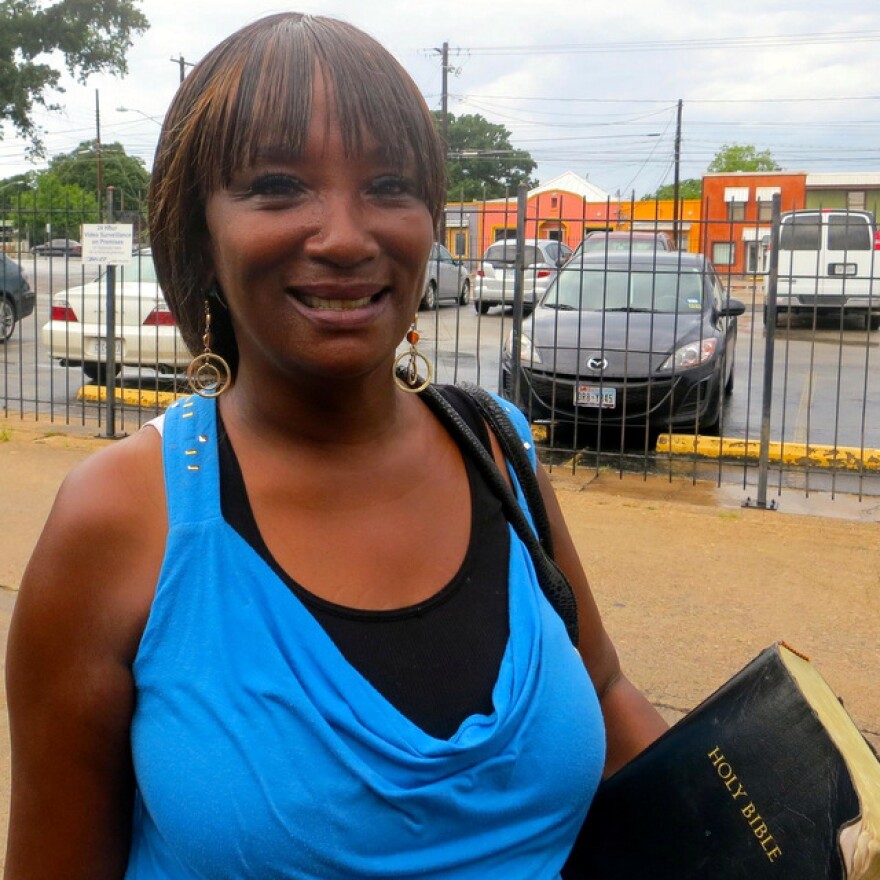It's a pretty uneventful morning at the corner of 12th and Chicon. Buses are running smoothly and on time. There's even a new art gallery in the area.
But there was a time – not too long ago – when prostitution, drugs, and other illegal activities were going down in the open, in the middle of the day.

Austin Police Sergeant James Dixon and Officer Tim Purcell used to work the East Austin intersection undercover. Dixon chuckles when he recalls how they made Purcell wear wigs.
Purcell says his undercover work paid off. "We would come out on a ten hour shift," he says, "and arrest fifteen to twenty people for selling drugs to undercover officers."
That operation lasted one year. The only difference it seemed to make was negative. People turned bitter. The community distrusted the cops. Dixon says the police weren't happy either.
But then, in early 2012, Austin staged an intervention: a Drug Market Intervention.
Here's how it works: Instead of going after low-level drug offenses, law enforcement partners with area churches and nonprofits to help offenders get off the street and into jobs. The initiative began at 12th and Chicon during the fall of 2012 – and so far, lots of folks say it's working.
Not too long ago, Debra Cobbs says she was a prostitute, a drug addict and an alcoholic. She was in constant trouble with the law and in and out of prison. But under the drug market initiative, Cobbs didn't get arrested. Instead, a church group called Mission Possible Austin embraced her.

Cobbs now has a job in telecommunications. She smiles as she says she just passed the probationary period at her job "I just got my Blue Cross Blue Shield [insurance], all those good things, you know?"
It's the very first time in years that 50 year-old Cobbs has been able to hold a job. She's also been able to stay clean and to resist the pressure from the dealers who sometimes come back. One day a week, she attends a Bible study at Mission Possible Austin, right across the street from where she used to wait for johns.
The day of the Bible study, the mission is full. The majority of the people there are recovering addicts. One the street, there aren't any people dealing in the open. Morevoer, there's no evidence of them even being in the area.
"It'd be naïve to say they've all been rehabilitated," Officer Purcell says. "But we really haven't seen a spike in crime in other areas." He says that after the intervention "we've seen a 77 percent reduction of violent crimes in this area." Recidivism from dealers is also down to 17 percent.
Since the initiative started, Purcell began addressing people not as suspects, but by name. As he roams the neighborhood, he greets people and they greet him back. They're not friends, but the relationship, for the most part seems cordial.
But just as it would be naïve to believe everything has reformed, it's also naïve to believe everyone sees the change from the police's perspective.
Take "Valerie" for instance (a woman Purcell calls "one of our regulars"). She says "things got better in [the] eyes [of APD], because all the minorities who was (sic) over here, they are either in prison or somewhere like that. That's the only way I can explain it."
Near where Valerie was, mechanic Arms Chapman says change has come at a great cost to the community. "It's typical Austin, you know? Tax out the poor and raise taxes," he says. "Gentrify the neighborhood through taxes."
As Chapman speaks, a man who had seen the police officers walking the neighborhood gets angry. He says his name is William; he says for him, nothing has changed. He screams and gestures that he still hates cops.
It hasn't even been two years since the intervention was implemented so changes – both positive and negative – are still new.
Waiting for her bus, right at the corner of 12th and Chicon, Debra Cobbs is heading home after her Bible study. She says William yells at her too. She says others pressure her to go back to her previous life.
But Cobbs says this time it's different. She feels strong and grateful. Others are grateful too. There's no more talk about shoot-outs or murders. And police say more and more people are getting jobs, thanks to the partnership.






